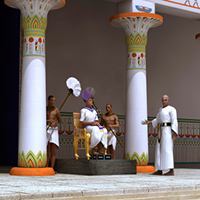
La monarquía en Israel
Aunque estaba rodeada por naciones que habían sido gobernadas por reyes durante muchos años: Asiria, Babilonia, Egipto y las naciones de Canaán, la monarquía y una forma centralizada de gobierno no apareció en Israel hasta cerca del año 1000 a. C. Antes de ese tiempo, las escrituras judías dicen… Read More












